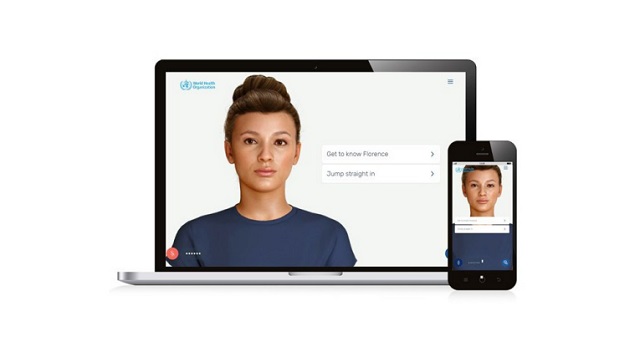
WHO and partners launch world’s most extensive freely accessible AI health worker
| THE INDEPENDENT | The World Health Organisation, with support from the Qatar Ministry of Health, has launched the AI-powered WHO Digital Health Worker, Florence version 2.0, offering an innovative and interactive platform to share a myriad of health topics in seven languages at the World Innovation Summit for Health (WISH) in Qatar.
Florence can share advice on mental health, give tips to de-stress, provide guidance on how to eat right, be more active, and quit tobacco and e-cigarettes. She can also offer information on COVID-19 vaccines and more. Florence 2.0 is now available in English with Arabic, French, Spanish, Chinese, Hindi and Russian to follow.
Florence has helped fight misinformation around COVID-19 since the beginning of the pandemic. The pandemic has had a significant effect on mental health. It is estimated that 1 in every 8 people in the world lives with a mental disorder. Her topics like tobacco and unhealthy diet kill 16 million people every year, while physical inactivity kills an estimated 830 000. These deaths are due to diseases like cancer, heart disease, lung disease, and diabetes that can be prevented and controlled with the right support.
“Digital technology plays a critical role in helping people worldwide lead healthier lives,” said Andy Pattison, WHO’s Team Lead for Digital Channels. “The AI health worker Florence is a shining example of the potential to harness technology to promote and protect people’s physical and mental health. At WISH, we aim to meet with visionary partners to continue to improve this cutting-edge technology. AI can help fill gaps in health information that exist in many communities around the world.”
“We are pleased to partner with the WHO for the development of Florence and are very excited about the opportunities this technology can offer to raise awareness of key health issues,” said Dr Yousuf Al Maslamani, Official Healthcare Spokesperson for the FIFA World Cup Qatar 2022, Ministry of Public Health.
“We know that providing advice on Florence’s key health topics, including mental health, nutrition and tobacco cessation is an important tool in our commitment to support people to make healthy lifestyle choices,” added Dr. Al Maslamani.
At the WISH conference, WHO released the beta version of Florence 2.0 to interact with scientists, public health organisations, entrepreneurs, and policy-makers and plans to continue to develop the digital health worker to help meet major health issues facing the world today.
“We are pleased to have Florence 2.0 launched at the WISH conference. This is a place for global actors to come together to find solutions for public health. WHO is demonstrating incredible innovation leadership by using groundbreaking empathetic AI,” said Nick Bradshaw, Director of Partnerships and Outreach at WISH.
The digital health worker is a prominent feature of the Sport For Health partnership between WHO and the Qatar Ministry of Public Health, which has been established to help make this year’s FIFA World Cup Qatar 2022 a beacon for health and safety.
The project is supported by technology company Soul Machines, which brings avatars to life in the form of autonomously animated Digital People. “Through this collaboration, we have created a personality for the frontline responder that is empathetic, informative, and understanding,” says Greg Cross, CEO and Co-Founder of Soul Machines. “Our Digital People operate and respond in real time, providing users with a unique and emotionally engaging experience. We look forward to continuing our work on Florence as we aim to positively reshape and transform the health-care industry.”
****
Source: WHO
The post Robot health coach appeared first on The Independent Uganda:.
from The Independent Uganda: https://ift.tt/1xOU0e7
0 Comments